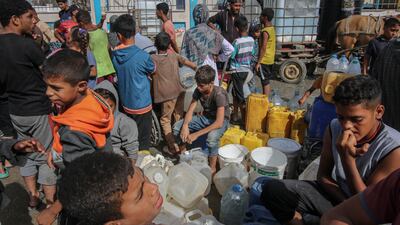Skin conditions have been spreading in Gaza’s so-called “safe zone” in Al Mawasi, near the southern area of Khan Younis, as people driven there by Israel's military operations struggle with a lack of water and proper housing.
Dr Hossam Nasser used to work at the Indonesia Hospital in the northern Gaza Strip but fled south after Israel launched its war against Hamas in October. Since then, he has managed to establish a field clinic for people who are unable to reach a hospital because of injury or the continuing fighting.
“The reason behind the spread of skin diseases is the shortage of water, which has led to people being unable to clean themselves properly,” Dr Nasser told The National.
“We are in the summer season and people usually take baths twice a day in hot weather, but now they can't even bathe once a week.”
The shelters used by the more than 500,000 people encamped in the area are mostly made of nylon or metal sheets and are unsuitable for long-term habitation, he said.
“The hot weather increases the potential for spreading diseases and these materials make the tents even hotter.”
The water available to the displaced people in Al Mawasi is not clean and unsuitable for use, while overcrowding in the tented areas has also exacerbated the spread of skin conditions, he said.
Dr Nasser said most of the cases he sees are skin-related, especially among babies because their skin is sensitive and needs special care. Some people come in with sores and blisters all over their bodies.
“The spread of flies and insects has caused these sores and boils to appear because of bites. These insects gather around the garbage and there is, of course, no water to maintain hygiene. These sores start at a single point on the body and without proper care, they spread all over.
“The difficulty in obtaining medicine to treat these cases makes the situation worse,” he said, referring to shortages of essential items in the Palestinian territory after Israel placed it under siege at the start of the war.
“Basic creams and antibiotics are unavailable, as are fever-reducing medications.”

Al Mawasi resident Eed, 40, who is living in a tent after fleeing Rafah, said the means to avoid infection were practically non-existent.
“The waste everywhere is a breeding ground for diseases and there is no medical care or medicine available. My tent, which I made from nylon, is so hot that we can’t bear to stay inside it. At the same time, it is not a good option to spend time outside it,” he said.
Another resident, Umm Omar, said her daughter Marwa, 7, was suffering from scabies spreading all over her body because of the lack of clean water, which her other children had to fetch.
“My children walk a long distance to reach it and bring it back here,” said Umm Omar, who fled to Al Mawasi from Beit Hanoun in northern Gaza.
“This condition is contagious and I cannot isolate my daughter from her siblings because we all live together in one tent. She is always crying because of the pain.”
She said she was able to get the medicine the doctor prescribed for Marwa, at a cost of 30 Israeli shekels ($8), but would not be able to do so again.
“I bought it this time, but I won’t be able to afford it next time because of the lack of money, and my husband doesn’t work,” she said.


